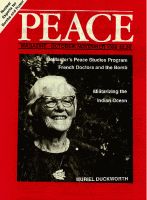
Peace Magazine Oct-Nov 1988, page 4. Some rights reserved.
Search for other articles by Metta Spencer here
Listen, there's a great new opportunity that the mainstream press has hardly touched! The most important objective for the peace movement is to call forth a Comprehensive Test Ban (CTB) Treaty. Maxime Faille's article (pp. 16 -17) explains why. The U.S. and Britain, after having promised in writing to create a CTB, have blocked all real work toward it. Canada claims to want a CTBT but, in every General Assembly vote on it lately, has supported only watered-down resolutions. Canada accepts the U.S.'s pledge of bilateral "stage-by-stage"nuclear test negotiations -- a stalling gimmick like Reagan's approach toward acid rain. The Soviet Union, whose leaders do want a CTBT, bought into the U.S.'s phony "stage-by-stage" proposal, on the theory that half a loaf was better than none at all. A bad mistake: They simply made it harder for other nations to reject it and demand prompt results. Worse yet, while the prospect of a CTBT vanished, other nations were unable to protest much.
So far. But wait.
About four years ago a peace activist named Aaron Tovish was reading the Partial Test Ban (PTB) Treaty of 1963 and noticed an unusual clause. It was a provision whereby the signatory nations could force other nations to convene the conference for the purpose of amending the PTB into a full CTB! Why had this been overlooked? Back in 1963, a CTB had seemed right around the corner. Because everyone had expected new negotiations to begin, the clause seemed redundant.
Aaron Tovish was a young activist in quite a different era, however, and recognized he'd found a golden key. This clause could force the reluctant U.S. to meet the other nations under the glare of the global spotlight. It could go on indefinitely, exposing the culprits to the well-earned scorn of world opinion.
Finding a key was one thing. Skillful use of it was quite another. This called for diplomacy, organizational savvy, persistence, and the ability to work quietly behind the scenes. Aaron went to the right places. He sought the advice of Canadian Bill Epstein, who had worked at the U.N. since before it was the U.N. -- when it was a Preparatory Committee. Epstein recognized what Aaron had found and seized it like a dog with a bone. They won the support of Parliamentarians Global Action, the international group with which Tovish was working as a consultant. It has vast diplomatic resources and its President, Olafur Grimsson, and Secretary-General, Nicholas Dunlap, have turned the idea into a reality.
Aaron Tovish, now its Executive Director, gives the credit to everyone else. You'd never learn from him that he'd found the golden key and discovered the secret of opening its rusty lock. Whenever I think of how one committed peace person can make a difference, Aaron's is the face that comes to mind. Congratulations to him, to Bill Epstein, and to Parliamentarians Global Action! The Test Ban Conference is going to convene!
So spread the word. Pass Maxime's article around. Raise some consciousness. Tell people that our government is going to face a test. Does Canada really want a Comprehensive Test Ban or not? Do you? Tell 'em! Multilateralism is our chance to count!
Peace Brigades International has its Central America Project Office at 345 Adelaide SL West, Ste. 606, Toronto M5B 1R5, Telephone 595-9484-not 335 Adelaide SL W. as reported. Peace Brigades donations are tax deductible.
Page 24, August issue stated that the Appeal from Hiroshima and Nagasaki has collected three million signatures in Japan. Reality: thirty million! Hooray!

Peace Magazine Oct-Nov 1988, page 4. Some rights reserved.
Search for other articles by Metta Spencer here